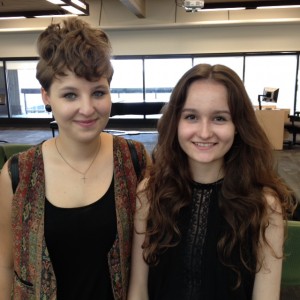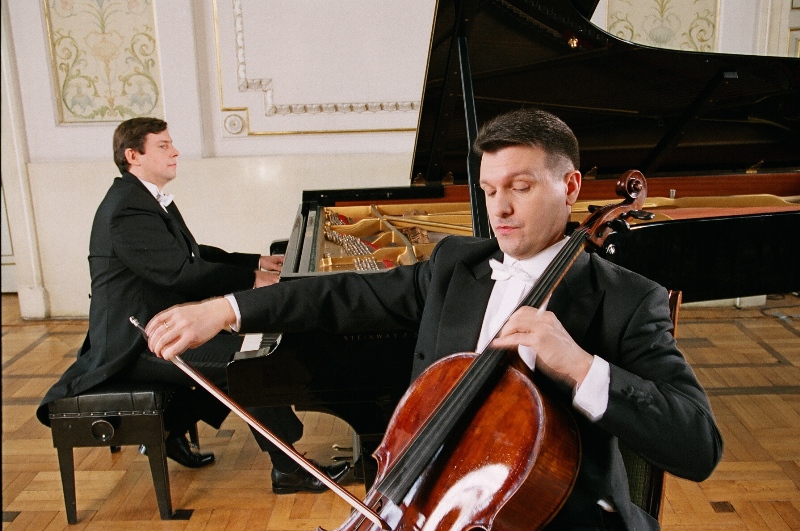A Conversation with Cellist Tian Bonian
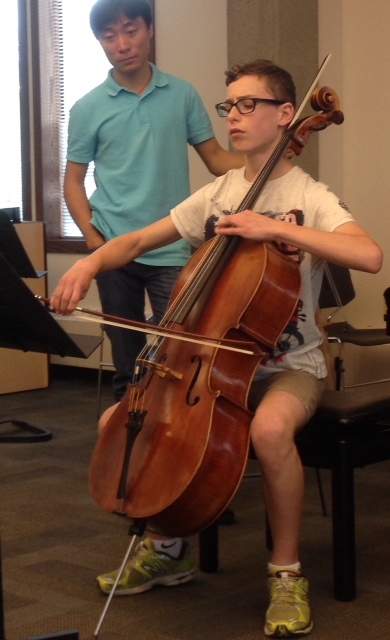
Teaching at Morningside Music Bridge is a little like coming home for Tian Bonian.
Bonian, 28, is principal cellist of the Gürzenich Orchestra in Cologne, Germany. But as a young student, he travelled to Calgary from his home in China three times to participate in Music Bridge.
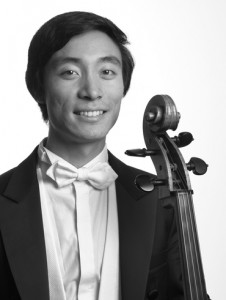
And this year marks the second time Bonian has returned as instructor to coach chamber and lead master classes for the next generation of classical musicians.
Question: How did being a Morningside Music Bridge student change your life?
Tian Bonian: I learned how people think and live in other countries, and I learned a lot of language here. A few years later I went to Germany to study in Europe, and I felt much more comfortable after coming to Music Bridge three times. It prepared me well.
Question: What is the best part about teaching young international music students?
Tian Bonian: Sometimes, they need help with technique for the right hand or the left hand. But I don’t have to teach a lot because they see each other play and they learn from each other. I know that from being here as a student before. When I’m teaching, I can learn a lot from the students, I can teach even better. The give-and-take is like ping-pong!
Question: Why is Morningside Music Bridge an important program?
Tian Bonian: It’s very important to invite students from the whole world, from different countries to come here and they can meet here like a big party. They learn so much.
Here’s what award-winning Winnipeg, Manitoba cellist David Liam, 14, has to say about learning from Tian Bonian:
“He’s alumni and he’s obviously learned so much in his career. We’re benefiting from all that he’s learned here and all that he’s learned after that, so it’s like we’re getting a bonus from all of his wisdom.”
Click here for a list of recitals and concerts on now until July 31.
A Conversation with John Perry
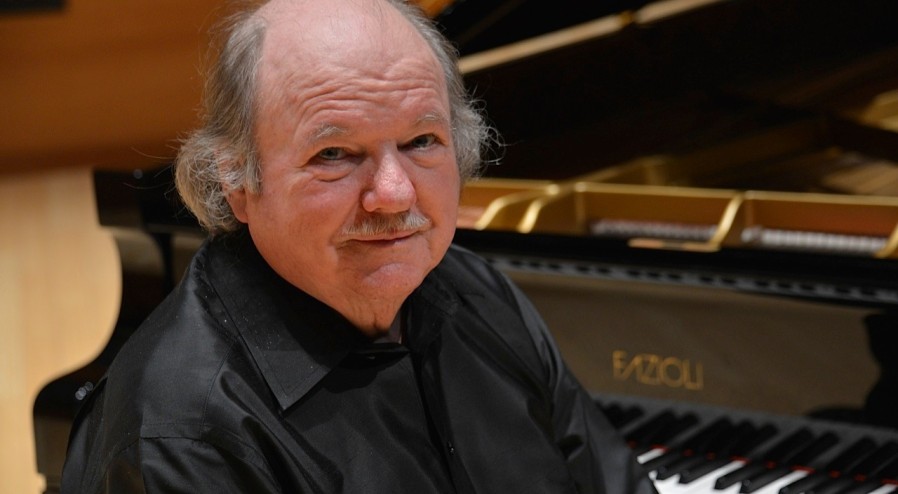
With a dizzying international performance and teaching schedule, it’s a wonder we caught up to chat with John Perry at all.
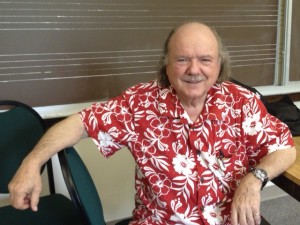
When the concert pianist is not teaching master classes around the globe, he’s jurying prestigious international piano competitions, hosting his own summer piano festival in California, and collaborating with some of the world’s finest musicians.
Thankfully, the Conservatory snagged him to teach at our international training program Morningside Music Bridge. And lucky us, he happily shared some thoughts on why MMB matters.
Question: You teach young pianists here at Morningside Music Bridge as well as in Banff, Toronto, Los Angeles, Florida, Italy, Germany and beyond. What is your mentoring philosophy?
John Perry: You bring all the experience of a lifetime in music. There’s not an outline, there’s not a syllabus… it’s impossible to describe. You bring what you have learned and all your own experience to a person who is younger than you who plays very, very well and you — with your experience and knowledge — are able to improve their playing and their musical understanding. It’s not easy but it’s simple.
Question: What was the best advice somebody gave you?
John Perry: The best advice was always about details and how to think and how to appreciate music. If you’re looking for that magic key, that thing that unlocks everything, you came to the wrong place. It’s not the way it works. It’s arduous, consistent work with an amazing amount of talent. It’s drudgery but with the most fantastic reward at the end imaginable.
Question: What’s your favourite part of Morningside?
John Perry: My favourite part is being a part of developing the enormous talent these people come with. They go away at the end of the month and they’re wiser and better and it’s going to make a tremendous impression on their future.
A Conversation with Tomasz Strahl
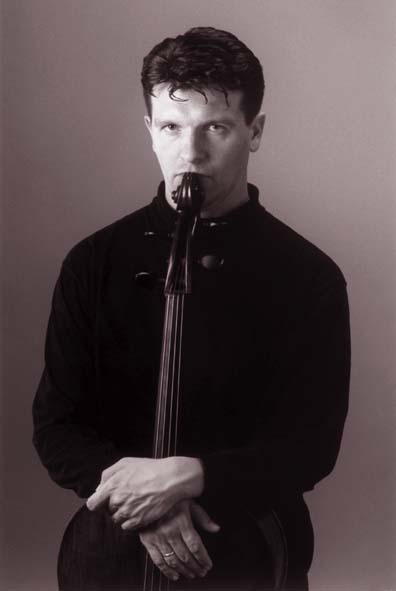
Mount Royal Conservatory’s Morningside Music Bridge is entering its 18th year, and it remains the only program of its kind worldwide.
The month of July is packed with masterclasses, rehearsals and performances for our 70 international students. Here to teach them are leading musicians from around the globe.
One of them is Warsaw’s Tomasz Strahl. The celebrated, prize-winning cellist is a laureate of
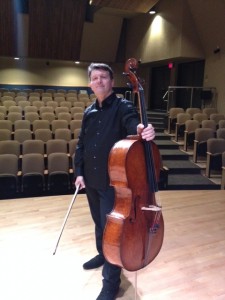
competitions throughout Poland and the world. When he isn’t performing with prestigious quartets and noted musicians, Strahl teaches masterclasses at the Chopin Music Academy in Warsaw, and in the Netherlands, Finland, Germany, Japan, South America and Calgary.
We caught up with Tomasz backstage in the Leacock Thursday night before his amazing performance of works by Schumann and Schubert with Morningside faculty David Moroz, Noah Bendix-Balgley, Teng Li, Tian Bonian and Diana Cohen.
Question: What makes Morningside Music Bridge unique?
Tomasz Strahl: This is a wonderful idea because the atmosphere is like an international gathering, not a competition. I admire young people from different countries — Europe, the United States, China, and Canada — playing together and spending time like families do.
Question: What has your experience been like as a mentor in Calgary?
Tomasz Strahl: Each professor (teacher), we generally agree, but we teach with different kinds of advice. It is my great pleasure to observe how the young people are open to my musical ideas. They want to know and pay attention to my advice. I’m working so much better because my connection with them is so strong. It’s a wonderful thing. They are first-class musicians.
Question: What has it been like to collaborate and perform with the international faculty?
Tomasz Strahl: It’s a pleasure to play with David Moroz and all the other fantastic musicians. Everyone in one place. It’s wonderful.
Question: How important is this program? For music students and for the world’s leading musicians who come to teach?
Tomasz Strahl: This music bridge, it really is a musical bridge for the different cultures. This is most important, the memories will be fantastic. After 20 years, they will remember this time in Calgary.
Learn more about upcoming recitals and concerts this month here:
A Conversation with Noah Bendix-Balgley
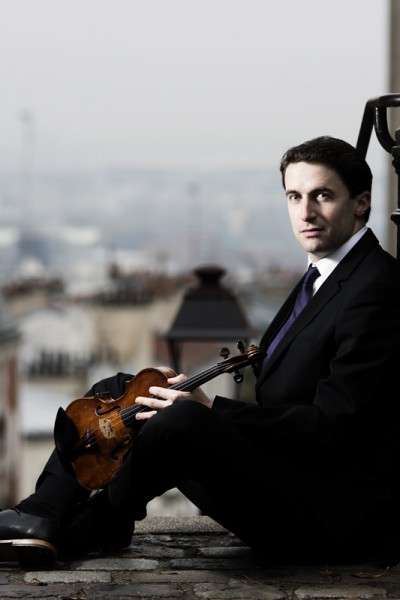
Winning an audition for Morningside Music Bridge is exciting enough, but learning from leading classical musicians is out of this world.
Violinist Noah Bendix-Balgley is at Mount Royal Conservatory’s intensive summer music training school, and performs a chamber music concert tonight with Tomasz Strahl, cello; Tian Bonian, cello; Diana Cohen, violin, Teng Li, viola; and David Moroz, piano.
This year, the 29-year-old won the position of first concertmaster with the Berlin Philharmonic after wearing the same hat for the Pittsburgh Symphony Orchestra.
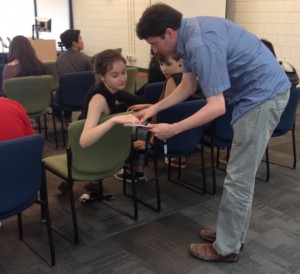
Bendix-Balgley was born in Asheville, North Carolina in 1984. He began playing violin at age four and by nine performed for Lord Yehudi Menuhin in Switzerland. He graduated from Indiana University’s Jacobs School of Music and the Munich Hoschschule.
Noah is a busy performer and teacher and we caught up with him between masterclasses at Morningside Music Bridge.
Question: What’s your mentoring style?
Noah Bendix-Balgley: I was very lucky as a student growing up — I had really great teachers. Now being a professional and teaching young violinists, I just try to take everything I learned from the teachers I had and try to pass along the information. It’s really fun, it’s really exciting to work with such talented kids like this. There are some really great talents here at Music Bridge.
Question: What was the best advice you received as a student?
Noah Bendix-Balgley: That’s a good question. I think the most important thing is to love what you’re doing and keep your passion for it. That drives everything else, that drives all the long practice hours and preparation for competitions and auditions. Never forget why you’re doing it.
Question: There’s so much pressure on performers and students. What’s a great way to try to combat that and get past the frustration?
Noah Bendix-Balgley: It’s two-fold. You have to have a pragmatic approach of ‘how do I deal with that pressure when I’m put in that situation.’ It’s a much different situation in your practice room — you can’t expect things will be the same once you get on stage.
I tell students to identify what changes when you’re on stage and work on the opposite in the practice room, compensating for what might happen on stage beforehand. Prepare for that so you’re not surprised.
Once you’re out there, you have to at some point let go because you’ve done the work already in lessons and practice. Yes there’s pressure and nerves there but the reward is that you’re able to make music for yourself and the audience. If you can’t enjoy that, what’s the point? A lot of it comes with experience.”
Question: This is your first time teaching at Morningside Music Bridge. What is your experience so far?
Noah Bendix-Balgley: It’s a really high student level. A lot of colleagues my age who came through this program are really successful now. That speaks the success of this program.
Here’s what two of Noah Bendix-Balgley’s masterclass students had to say about their experience:
Marta M., 16, from Poland: “I’m really honoured to learn from him. I never thought I’d have a lesson from such a great player and teacher. He has an amazing talent for teaching. I once had an excellent teacher who passed away, and after playing Bach with Noah, it was like coming back to these times, the same feeling again. It was really touching.”
Wikoria B., 16, Poland: “His advice is very simple but very important and helpful.”
CONCERTS: There are still many recitals and concerts to take in!
A Conversation with Violinist Ning Feng
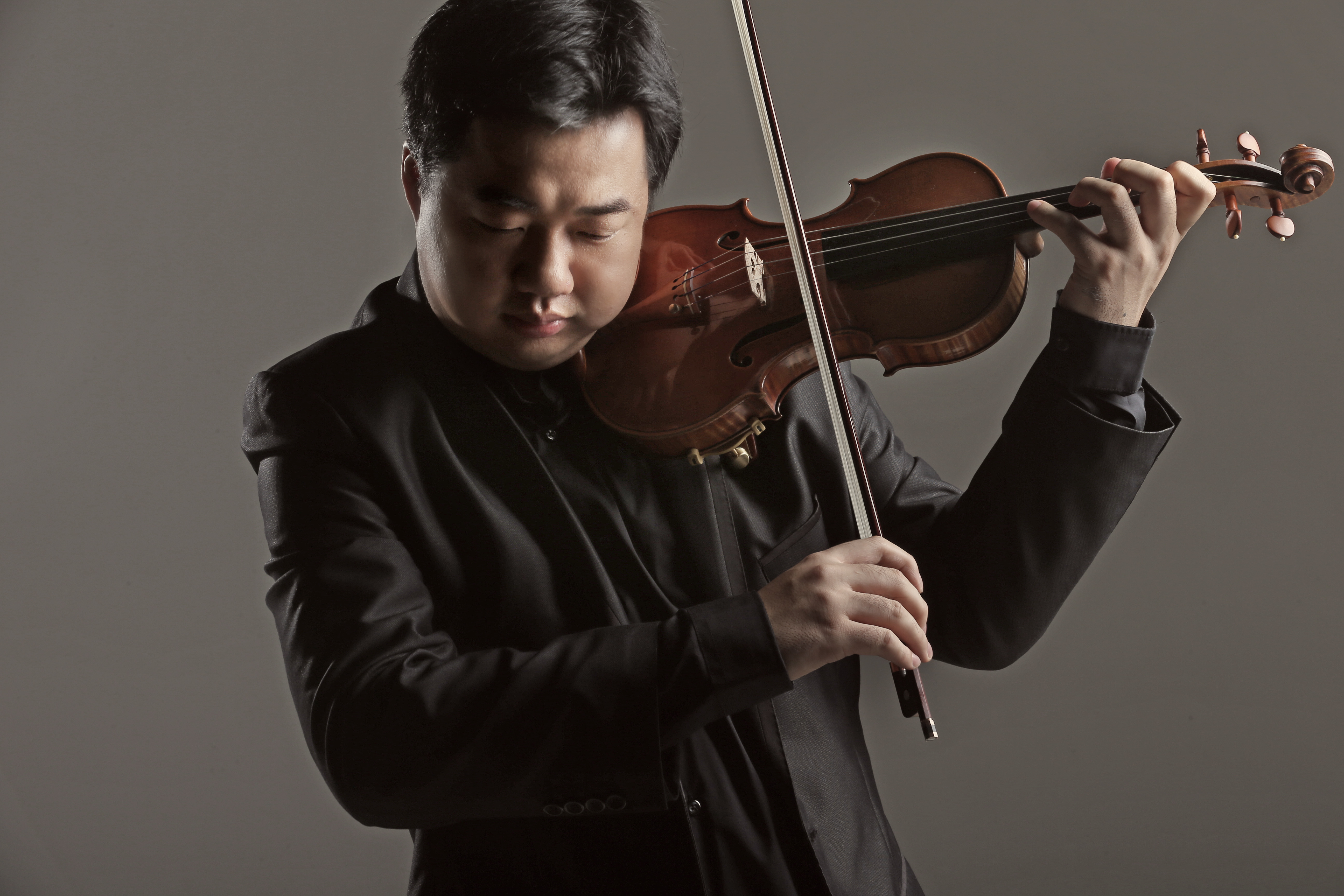
Violinist Ning Feng may be living in Berlin and performing concertos and recitals around
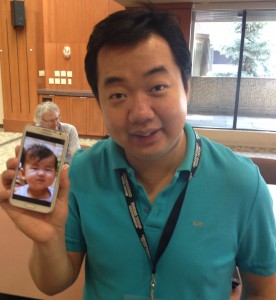
the globe, but during July, he’s all ours.
The Morningside Music Bridge faculty member has been with us since the international training program began 18 years ago, first as a student and now as a sought-after teacher for masterclasses.
Born in Chengdu, China in 1981, Ning Feng has won many of the world’s most prestigious classical music awards.
We caught up with the violinist (and new father!) between masterclasses to learn more.
Question: What is your philosophy about mentorship?
Ning Feng: The start is to always love what you do. One has to feel passionate for what you do in order to do it well. Everything comes with a lot of work, a lot of frustration, a lot of disappointment. The only thing that keeps us going — regardless of the obstacles in front of us — is the passion. One has to love what they do in order to do it well.
Question: How big a role has Morningside Music Bridge played in your life?
Ning Feng: So far I’ve played every possible role I can play. I was one of the very first students, I came back as a translator, and now as a faculty member.
Question: What does Music Bridge mean to you?
Ning Feng: It’s a family for me: my sister is here, my brother is here, I even met my wife here. Ours is the first Music Bridge baby. All of this means the most to me, the relationships that we have.
Here’s what Ning Feng’s student Yaegy, 16, from New York has to say about him:
“I played Bach today and his lesson was one of the most different. Everyone plays Bach the same and I was really happy he approached it in a very different way while also respecting the way I played it — which was different from what he wanted, I could tell. He’s open to new ideas. He respects the students’ decisions while teaching them new things.”
Click here for Morningside Music Bridge concert and recital times.
A Conversation with Concert Pianist Krzysztof Jablonski
From Morningside Music Bridge archives: Pianist Krzysztof Jablonski joined by cellist Tomasz Strahl.
There’s plenty of excitement around the Conservatory — Morningside Music Bridge kicks off today. We have more than 70 international and local students filling our hallways!
Our 18th annual intensive summer music school is a partnership between China, Poland and Canada, bringing together top students and the world’s leading musicians to teach them.
Among our talented teachers is Mount Royal Conservatory faculty member Prof. Krzysztof Jablonski.
Jablonski was born in 1965 in Wroclaw, Poland.
He started piano lessons at age six and he performed his first concert with an orchestra at age 12. He won many scholarships and first prizes at piano competitions in Poland. As the youngest competitor at age 15, he placed fifth at the Milan Piano Competition, Premio Dino Ciani.
Throughout his career as a concert pianist, he has received numerous awards from prestigious competitions and has toured the world.
In 1998, he immigrated to Canada and he now calls Calgary home.
Question: What are you most looking forward to at this year’s Morningside Music Bridge?
Krzysztof Jablonski: To work with young, energetic and eager-to-learn pianists, to share my knowledge and experience with them, to meet my dear friends and immerse myself in intense music making.
Question: How important is classical music in Poland: to listeners, to musicians?
Krzysztof Jablonski: Classical music has always had its important place in Polish people’s hearts. It’s a long tradition, our country had great composers and performers, great teachers as well.
Polish audiences are sensitive, and they react in an authentic way. If they don’t like something, no standing ovation. It was always difficult in the past to satisfy the Polish audience when there were more people knowing quite a lot about music.
With the changes that are affecting most countries in the world, classical music has still its audience and place, but I have a feeling it is not as strong as it used to be.
I think music is and has to be important to every musician — otherwise we would not be able to dedicate our lives to something that is so transient, ephemeral. We never really have it, we just experience it momentarily and the rest is just the feeling and impressions left.
Question: Why did you choose to perform to Chopin and Liszt for your upcoming concert? (July 6, 7 p.m. in the Leacock Theatre. Tickets are $25 for adults, $20 for students, seniors and MRU alumni. Click link for tickets.)
Krzysztof Jablonski: There are various reasons for that. The recital program is actually the same one I am going to perform during my Asian concert tour I am starting on July 14. As I am performing several different recitals, chamber repertoire as well as works with orchestra, it is simply wise to not overload my practice time with too many works, especially having teaching activities on top of my daily practice schedule.
Second and even more important: these are works that are all dear to me. There is a lot about life and death, about love, about losing of someone dear, about passions, screaming protest against our fate and much more.
I start the program with B flat minor Sonata which – in its centre point – has Funeral March. This is the music performed during Polish funerals. There is no person in Poland who does not recognize this heartbreaking melody. The extraordinarily beautiful music of Liszt is also in my program. I wanted to present to Calgarians another Liszt. This is the composer whose works, for many people, are associated with so called pianistic fireworks and virtuosity in its purest form.
Well, the works I will be performing are also virtuosic pieces but this is meaningful music at the same time. Focusing on its pianistic difficulties would be unforgivable. I try to expose the beauty of this music as much as it is only possible and I hope my listeners will like it!
Sherri Zickefoose, July 2, 2014

